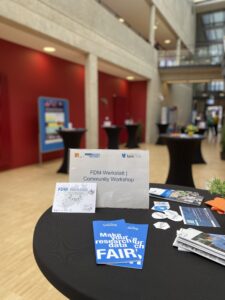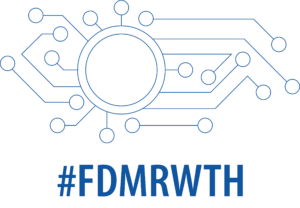The first two days of the FDM workshop have already been reported on the RDM blog. On the third day of the FDM workshop, everything revolved around the FDM tools LiaScript, Datalad and Coscine. A discussion round on the DKZ.2R data competence center was also part of the last day’s program. You can find out more about the details of the individual sessions in this article.
The Morning Program
The day began at 9 am with two parallel sessions.
The first session dealt with LiaScript. LiaScript is an extended machine-readable language based on Markdown. It allows not only simple formatting of text, but also the integration of interactive elements such as quizzes, code execution, diagrams and much more. LiaScript is often used to create interactive learning content, presentations and teaching materials. It combines the simplicity of Markdown with the functionality of interactive learning environments.
In parallel, a session was held on the connection between Datalad and Coscine. DataLad is a free data management platform that not only establishes structures and ensures reproducibility, but also promotes collaboration and can be integrated into widespread data infrastructures. By using Git and git-annex, DataLad enables version control of any size of files in datasets without the need for special data structures, centralized infrastructures or third-party services.
The Afternoon Program
After a one-hour lunch break, the participants continued their exploration of research data management.
The third session of the day was a “Coscine Technical Ask Me Anything” session, where participants had the opportunity to ask their technical questions around the use of Coscine. The discussion was extremely informative and allowed participants to clarify their questions of understanding and gain valuable insights from the developers about Coscine. It was noted that the search functionality in Coscine is based on ElasticSearch. In the settings, you can specify whether only project members or all Coscine users can search for metadata. In the future, there will probably also be a search function that can be used by non-logged-in Coscine users. This is being developed under the term “Metadata Hub”. Logging in via ORCiD was then discussed and what options users then have in Coscine. In short, logging in to Coscine via ORCiD enables the creation of projects and resources, but only RDS-independent resources (LinkedData and GitLab). It is therefore advisable to link the login options in order to be able to use the full range of Coscine functions. It was also noted that it should be possible to use the GitLab resource type not only with write rights, but also with read rights. The developers suggested an easy-to-implement solution here: adjust the settings of the token for the use of the GitLab resource accordingly and thereby control the access rights. Uploading data larger than 2 GB via the web user interface does not work due to browser restrictions. It is therefore recommended to use the RDS S3 resource via S3 clients, for which a storage space request must be submitted in advance. Work is also underway to implement a registration app (RegApp) in the future to make it easier to select your own organization when logging in. Furthermore, data managers are to be appointed for institutes in the future to ensure that a contact person is available for “orphaned” projects. A general recommendation for reporting errors was also made at the end. In such cases, users should send a detailed description of the problem, ideally including screenshots and a trace ID, to the contact address of the respective institution.
The last session of the day was a discussion round on the Rhine-Ruhr Data Competence Center. The participants exchanged views on the need for improved information distribution within the institutions and direct advice for individual researchers. A need for further training courses for RDM experts and a central training platform was identified. The idea of adapting training courses to archetypes and introducing a review process for data quality was formulated. The DKZ’s target group includes researchers at all career levels and fdm.nrw service point employees. It was proposed to create concrete offers to address researchers and local RDM managers and to create incentives for community participation. Various information channels such as Instagram, Pixelfed and LinkedIn can be used to show the potential of data and share best practices. Overall, the importance of close collaboration and clear communication within the DKZ was emphasized in order to provide effective support for the research community. The discussion round on DKZ.2R was very intensive and productive. The numerous ideas and suggestions will now be further discussed and evaluated internally at DKZ.2R in order to develop and adapt the service offerings accordingly.
Learn More
We would like to thank all participants for their lively interest and the exciting discussions that workshops like this thrive on. We look forward to the next FDM workshop!
If you have any questions about the FDM tools or FDM in general, simply write a message to the ServiceDesk. The FDM team looks forward to hearing from you.
Responsible for the content of this article is Arlinda Ujkani.






Leave a Reply
You must be logged in to post a comment.